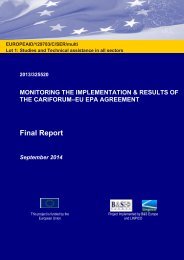A GROWTH-INDUCEMENT STRATEGY FOR JAMAICA IN THE SHORT AND MEDIUM TERM
A GROWTH-INDUCEMENT STRATEGY FOR JAMAICA IN THE SHORT AND MEDIUM TERM
A GROWTH-INDUCEMENT STRATEGY FOR JAMAICA IN THE SHORT AND MEDIUM TERM
You also want an ePaper? Increase the reach of your titles
YUMPU automatically turns print PDFs into web optimized ePapers that Google loves.
This desirable outcome is boosted by the role fiscal consolidation plays in stabilizing the<br />
macro-economic environment through low inflation, stable exchange rate and low<br />
interest rate, while creating facilitative conditions for private investment.<br />
Hence, fiscal consolidation has to be perceived as credible if it is to signal to the private<br />
sector that the government will be smaller, more efficient and complementary, and<br />
provide services at a lower tax-price, and if it is to be foundational in economic<br />
expansion. Its success rests exclusively on the emergence of a positive psychology and<br />
positive expectations by households, workers and firms in the economy. Economic<br />
agents must be convinced that the fiscal consolidation programme is credible, i.e.<br />
properly rationalized and/or timely and/or sustainable and/or irreversible, for them to<br />
extend their rational expectations beyond the short term and imagine a rise in their<br />
permanent wealth and income.<br />
It is important to note here the result of failure. Under the failure scenario the economy<br />
would experience the predictable Keynesian response of a macroeconomic decline in<br />
economic activities and output and deflationary tendencies to fiscal consolidation. This<br />
Keynesian effect would be compounded by the shock of the global recession, and the<br />
structural rigidities clogging interest rate and price transmission mechanisms in the<br />
economy.<br />
5.0 The Evidence<br />
The Fiscal Consolidation Programme includes:<br />
rationalization of the public sector<br />
increase in taxes<br />
Debt Exchange Programme (JDX) to lower interest expense and extend the<br />
maturity of government instruments<br />
steps towards enactment of Fiscal Responsibility Laws.<br />
This Programme is aggressively pro-cyclical, and is being implemented at a time when<br />
the economy is in a recession, thus exacerbating the downturn and delaying the recovery.<br />
Our experience so far has included:<br />
decline in private sector demand for credit despite the lowering of nominal<br />
interest rates<br />
decline in the demand for the US dollar due to increased supply of foreign<br />
currency and noted fall of private sector demand<br />
decline in output in most industries resulting in increased unemployment<br />
levels and net private sector job losses of 86,600 since the official start of the<br />
recession in October 2008<br />
decline in household demand for credit.<br />
The Programme has been further challenged by the shocks of:<br />
the longer than anticipated global recession<br />
33






